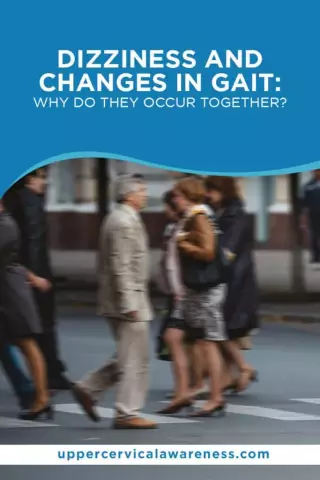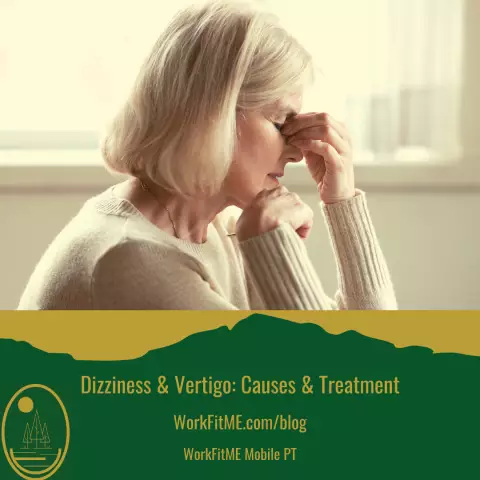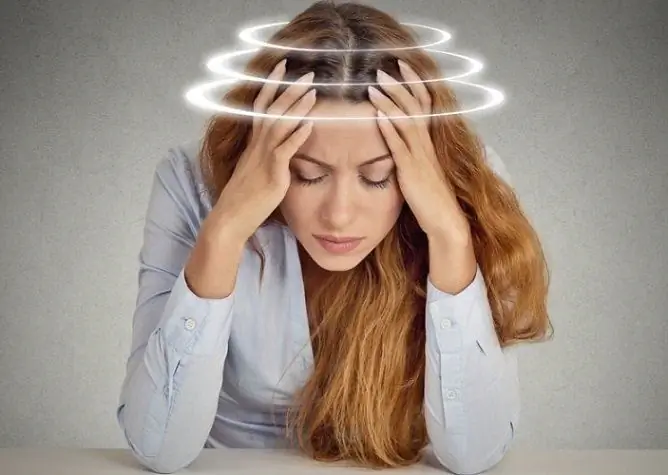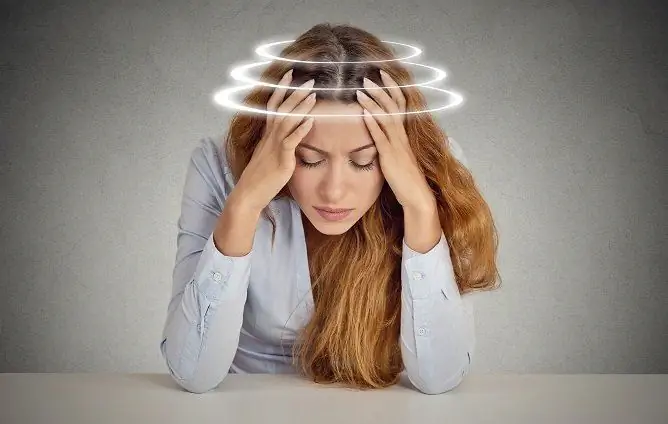- Author Rachel Wainwright wainwright@abchealthonline.com.
- Public 2023-12-15 07:39.
- Last modified 2025-11-02 20:14.
Dizziness - why does it occur and what to do?

Probably, everyone knows firsthand the feeling that the world has suddenly moved from its usual place and floated away. The head is spinning - we say when we jump up abruptly, our head is spinning when we go out into the street after an illness and inhale fresh air, our head is spinning when we look down from a height and when we ride the rides. This is all physiological dizziness, a normal reaction of the nervous system to certain stimuli. But it also happens that dizziness attacks happen for no apparent reason, when they shouldn't be at all, and even regularly. They can have different intensities, from a fleeting but persistent sensation to the appearance of discoordination of movements, disorientation in space, nausea and vomiting. Dizziness can be completely harmless, or it can signal a serious health disorder. When is dizziness dangerous, and when is it not, and is it possible to take effective measures against it? We propose to talk about this in today's review.
True dizziness
Sometimes dizziness is called any strange and unusual feeling that arises in the head. I must say that many strange feelings arise in the head: a feeling of weightlessness, for example, a feeling of disorientation, a feeling of a “heavy head” and others. But true dizziness is a person's feeling of himself moving relative to static objects, or on the contrary, the feeling of objects rotating around him. Dizziness is accompanied by a loss of orientation in space, which leads to confusion and associated anxiety, severe attacks of dizziness are often accompanied by symptoms of disorders of the autonomic nervous system: nausea, vomiting, sweating, pallor of the skin. Although these sensations are not very pleasant, dizziness in itself is not dangerous, except for those momentswhen it overtakes a person during responsible and risky activities, such as driving a car. But it is necessary to find out the cause of its occurrence, since it can be a symptom of various, including rather dangerous, diseases.
Causes of dizziness
Depending on the cause that caused it, dizziness can be central or peripheral. Central dizziness occurs with disorders of the brain, and peripheral with lesions of the vestibular nerve and diseases of the inner ear.
The mechanism of vertigo is as follows: information about the position of the body in space, received by the peripheral nerve endings of the vestibular apparatus located in the inner ear, is transmitted to the brain, namely to its stem section, to the so-called vestibular nuclei. There, the information is processed and enters the center of balance located in the temporal lobes of the brain. Disruption of any part of this nerve impulse pathway can lead to dizziness. Thus, dizziness can occur due to injuries, tumors, vascular disorders, general diseases affecting the nervous and vascular components of the vestibular apparatus, such as diabetes mellitus, taking strong drugs and other similar reasons.
Diagnostics
Sometimes dizziness is a symptom of a disease. It is possible to determine which one, by some characteristic features:
- Dizziness is persistent, accompanied by tinnitus, hearing impairment, nausea, and even vomiting, the reason is most likely in the disease of the inner ear - Meniere's disease;
- Dizziness, accompanied by a decrease in hearing on the one hand, noise in the ear on the affected side, aggravated by a change in position, with an increase in symptoms and the addition of persistent headache, is often a symptom of a brain tumor - neurinoma;
- Dizziness preceding attacks of intense headache, accompanied by nausea and vomiting, is characteristic of migraine;
- Sudden intense dizziness, aggravated by a change in body position, accompanied by nausea, vomiting, tinnitus, persistent and lasting for several days, indicates inflammation of the vestibular nerve - vestibular neuritis;
- Similar symptoms, accompanied by impaired coordination, weakness of the arms and / or legs on one or both sides of the body, may be signs of a stroke;
- Dizziness attacks of mild and moderate intensity, in the presence of restriction of movement and pain in the neck, indicate cervical osteochondrosis;
- Dizziness following a head injury, accompanied by headache, nausea, and vomiting, is characteristic of a concussion.

The described symptoms do not necessarily clearly indicate a particular disease, but are only characteristic of the standard clinical picture of some of them, and therefore you should not try to diagnose yourself, and even more so independently prescribe treatment. The reliability of the diagnosis for such signs is small, and therefore, with intense, prolonged or regular dizziness, you should consult a doctor, describe the complaints in detail and accurately and undergo the proposed examination. Only on the basis of its results can a diagnosis be made.
What to do when your head is spinning
If you feel dizzy, you need to sit down or lie down, close your eyes, try to provide fresh air. For a while, you need to avoid movements, especially sharp ones. If mild attacks of dizziness happen only from time to time, then you can limit yourself to only this, you can also drink a cup of coffee or strong tea.
The dizziness that occurs when you sat for a long time, and then suddenly stood up, is "treated" is not difficult: you need to wait until it subsides and do a few simple exercises: waving your arms, turning your head, squatting, and later, if your work is associated with a long sitting, take active breaks for a little gymnastics.
Contrary to common advice, no medication is worth taking. If dizziness bothers you so much that you think it is necessary to take medication, then you should see a doctor who will prescribe what you need.
Found a mistake in the text? Select it and press Ctrl + Enter.






